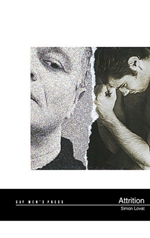 Attrition
- Simon Lovat
Attrition
- Simon Lovat Attrition
- Simon Lovat
Attrition
- Simon Lovat
Ladymol's
Review:
This is a very well written novel and I did read it quickly and enjoyed it. Iím not sure itís the book I was expecting though or that it has made any particular impression on me. In a strange way I feel as if the author had a great premise in mind: gay son returns to his estranged father to nurse him as he dies, and deep, repressed emotions surface from the past. But then he realised he hadnít worked out exactly what these repressed things were going to be, so he gave the novel a very flat, conventional ending.
The first two thirds of the novel build you up to expect all sorts of revelations: the father has found some kind of spooky religionóhow? Why? Is he being manipulated by sinister forces? There are hints that the house was once hauntedóstrange things happened in it: sibling violence promoted, mother dying. The sonís lover disappears from London while heís away. Why? Can this be related to the fatherís dying?
All of these are possibilities.
Then the story turns into a polemic on grief and the death of parents. Itís still well written; itís still believable, but itís not the novel it purported to be. Itís all rather odd.
There is nothing gay about this novel really, except that the son is gay and sees this as the reason his father hates him. Itís nothing very original, and certainly didnít add anything to the book.
So, I donít condemn this novel and if you want to read a thoughtful, emotional journey of a man coming to accept the loss of his mother and the dying of his father, then I recommend it.
Gay? Psychological thriller? Not really.
Cerisaye's Review:
I donít know what to say about this novel, other than I read it and it was okay.† I was disappointed in a story that failed to develop plotlines with intriguing promise.† Some bits were good, very emotionally involving, speaking to all of us, as sons/daughters whether gay/straight/bi.† Ultimately, it didnít work for me.
I donít just mean thereís no sex.† Now Iíve mentioned it, I have to say there isnít any.† Not that that omission makes it a bad story.† The focus is on family not romance or lust.† That the main character is gay doesnít matter as much as heís son and brother.† Which is great.† Too often characters are defined by their homosexuality, either marked and made to suffer, or engaged in hedonistic pursuit of pleasure.
Basically the book is about parents and childrenÖhow relationships develop over timeÖ.how the past stays with us and informs usÖmisunderstandings and mistaken assumptions.† The best sections reveal a mother-son relationship I found truly moving, but for the most part it examines in excruciating detail a father-son dynamic thatís dysfunctional but inescapable.†
Weíre connected to our families with ties of blood and memory that canít be ignored.† We all revert in the company of parents to that faraway child. What happens when the roles are reversed?
Pip Winter (great name) is a non-too-successful actor in his mid-thirties, entangled with an emotionally manipulative lover, Callum, who barely figures in the story.† But the fact Pip has a lover isnít important.† Pipís father is dying, so heís roped in by his lawyer sister to help out for his final weeks, despite having been estranged for years.† Pip welcomes the chance to escape his manipulative loverÖto go to a father who could give master classes.
Two events loom large in Pipís memory shaping his relationship with Harry, his father, and the way he thinks about himself.† Aged 16 he announced he was gay, and dates Harryís antipathy towards him from that day.† Aged 31 his father refused to allow Pipís lover of 2 years, Rob, to share his bed in the family home.
Harry, however, doesnít see things in the same way.† Pipís sexuality matters less than his decision to give up horse racing.† Harry is a bitter man, sorely disappointed in life since an accident ended his career as a jockey.† The nature of his illness is a surprising twist that sadly isnít developed in the story.† Thereís another sub-plot involving a religious cult Harry has become involved with, despite lifelong atheism.† Itís a desperate attempt to save himself, and involves total rejection of his past life.† Again the writer sets up expectations only to drag us back to the intensely difficult battle between Pip and his father.† I wanted to know more about Harry, what sort of man he was before marriage and family.
Pip has failed equally in his relationship with Callum.† Maybe the point is that heís incapable of loving anyone, himself included, having been denied his fatherís affection. Yet he had a very strong bond with his mother, and is close to his sister.†
Pipís mother died when he was 12, and the family never recovered.† Pipís lover Rob also died.† So Pip is emotionally wounded.†† But heís willing to sacrifice a big TV break to be with his cantankerous, ungrateful father. Harry is so horrid I couldnít feel any sympathy and wanted Pip to leave him to it.† Heís a frightened old man still playing games and denying Pip the approval he so desperately needs.† Harry is called upon by the cult to deny his family, so Pipís expectations seem doomed to fail.† I hope Pip puts it all behind him and starts to live his own life.
Publisher: Millivres-Prowler Group Ltd. IBSN: 1902852125
Buy from Lambda Rising Booksellers in the States